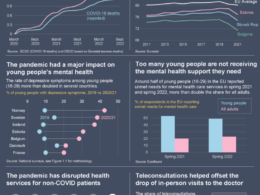the health strategist
institute for continuous health transformation
and digital health
Joaquim Cardoso MSc
Chief Researcher & Editor of the Site
April 25, 2023 (2020 republication)
ONE PAGE SUMMARY
Xtelligent Healthcare Media, wsurveyed 363 healthcare industry leaders to understand their response to COVID-19 and how it is changing the future of care delivery.
- The report reveals that the COVID-19 public health crisis is pushing the industry further away from fee-for-service reimbursement and towards value-based care.
- However, the pandemic is impeding conversations and financial stability needed to make this transition a reality.
- Many organizations are uncertain of the financial impact of COVID-19, making it difficult to focus on innovative payment models.
- Providers in capitated payment models were relieved that their reimbursement was not tied to office visits, while those in fee-for-service arrangements saw a drop in revenue.
- Before value-based care conversations can resume, organizations must stabilize their finances, and then work to understand the impact of COVID-19 on reserves, premiums, and reimbursement for the future.
DEEP DIVE

Coronavirus Pandemic Impacts Value-Based Contracts
The COVID-19 public health crisis will push the industry further away from fee-for-service reimbursement and is currently impacting conversations about value-based contracts
Revenue Cycle
By Emily Sokol, MPH
September 08, 2020
The coronavirus pandemic highlighted the importance of value-based contracts and reimbursement and will continue to push the industry towards these models of care, according to healthcare stakeholder responses in Insights by Xtelligent Healthcare Media’s latest report.
The Future of the Healthcare: Moving Beyond 2020 surveyed 363 healthcare industry leaders to understand their organization’s response to COVID-19, building off of previous work from Insights at the start of the pandemic.
The latest report looks beyond the pandemic to examine how an organization’s coronavirus response will change the future of care delivery. The goal was to uncover how organizations plan to move forward and understand what the new normal in healthcare will look like.
Across the board, survey respondents predicted the public health crisis would push the industry away from fee-for-service reimbursement and towards value-based care. Forty-one percent of all respondents agreed or strongly agreed with that statement.
Organizations across the industry reflected the same sentiment, as hospitals, physician groups, and payers all agreed COVID-19 was shifting the industry further away from fee-for-service.
“We’ll see more pushes in the name of value-based care,” said one medical center administrator interviewed during qualitative follow-up.

Long term, it seems inevitable that the pandemic will push the industry further towards value-based care.
But in the interim, the coronavirus is actually impeding the conversations and financial stability needed to make this transition a reality.
Many organizations are uncertain of the financial impact coronavirus will have on their organization, the report reveals. Only 20 percent of all survey respondents felt their organization would definitely financially recover moving forward and over half (58 percent) of respondents believe it will take between seven months and two years for their revenue levels to stabilize around pre-pandemic levels.
Industry leaders are concerned about the immediate financial impact of COVID-19, making it difficult to focus on innovative payment models that push the boundaries of the industry. I
t is unsurprising that 13 percent of all survey respondents reported COVID-19 would definitely impact their adoption of value-based contracts. Another 21 percent of respondents said the coronavirus probably would impact these contracts.
Provider organizations in capitated payment models were relieved, particularly at the start of the pandemic, that their reimbursement was not tied to office visits.
Meanwhile, those in fee-for-service arrangements saw a drop in revenue with fewer patients coming into physician offices.
Provider organizations in capitated payment models were relieved, particularly at the start of the pandemic, that their reimbursement was not tied to office visits.
These revenue challenges highlighted the importance of value-based payment arrangements for providers.
But the immediacy of tackling the COVID-19 pandemic outweighs many leaders’ desire to begin value-based care contract negotiations. Only one percent of all survey respondents believed the pandemic would not impact their negotiations either positively or negatively.
“COVID is just a little blip,” a national managed care organization representative emphasized in qualitative follow-up.
“We are seeing delays in providers adopting value-based contracts. But as it [COVID-19] gets worked out, providers will be more on board. Long-term value-based care is the way to go and providers are going to see that.”
Before value-based care conversations can resume, though, organizations must get a handle on their finances. Revenues must stabilize in order to build organizations’ confidence in their ability to take on advanced payment models and financial risk.
Teams should work to understand the impact of COVID-19 on reserves, premiums, and reimbursement for the future before figuring out how to leverage innovative payment models. But the momentum of value-based contracting must continue. Once organizations understand how the coronavirus will affect them and their patients, value-based conversations should resume immediately.
Originally published at https://revcycleintelligence.com/












